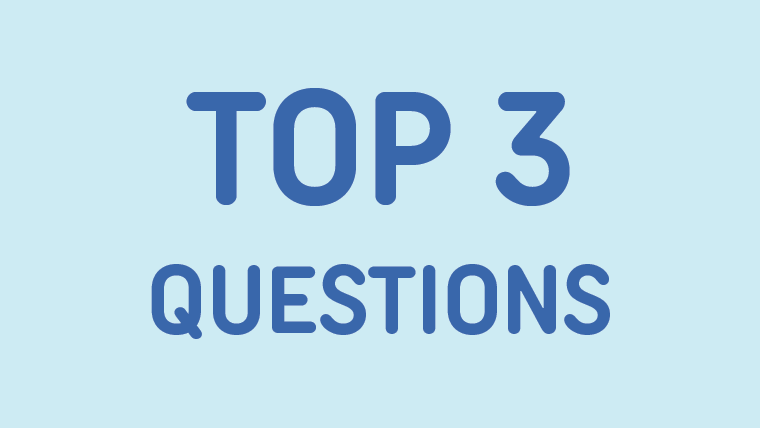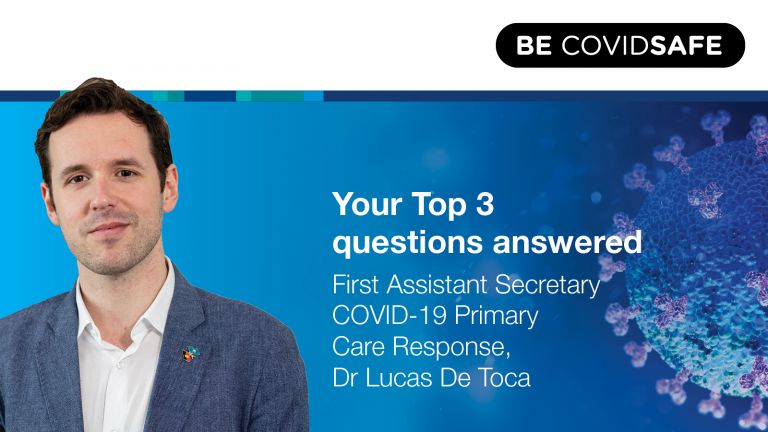
Good morning. I am Dr Lucas De Toca and I lead the Australian Government's rollout of the vaccine through GPs.
Welcome to this segment in which we will be answering the top three questions you've been asking through social media. We need to address the questions most important to you.
We had some technical issues before, if you are watching before, we are starting from the beginning.
I am joined by Linda, as always to do Auslan interpreting to make sure everyone can follow.
We are on the land of the Ngunnawal people, Dhawra nhuna, dhawra Ngunawal. Yanggu gulanyin ngalawiri, dhunayi, Ngunawal dhawra. Wanggarralijinyin mariny balan bugarabang. And I acknowledge the traditional owners of the land where people may be watching from.
A big shout out goes out today to the millions of people who are currently in lockdown in Melbourne and Sydney. And people subject to other public health restrictions across the country. We know it's incredibly hard and it takes a big toll, particularly Victorians in their fifth lockdown, but it's an effective way to try to contain the spread of the virus so we are grateful for what you are doing to keep yourself, your family, your community and all of us across Australia safe from COVID-19.
I want to acknowledge the health workers in Sydney that have been working around the clock contact tracing, testing, supporting the response and even in the non-direct COVID line, seeing patients for healthcare while wearing PPE and working long hours, thank you for everything you do.
A lot of our discussion today is going to be on variance and vaccines and how the variance in vaccines interact. The first question we've been getting is about the so-called delta variant or delta strain and how it affects vaccination and whether we will need booster doses.
As a quick recap, all viruses mutate, that means is a virus spread from one person to another and replicates or divides inside the body, there is a chance it might make an error making a copy and change. Most of those changes or mutations mean nothing and they get screened out or make the virus not viable. But sometimes a mutation gives the virus an advantage and it is selected and amplified and develops into a new strain or variant. The B1-6172 strain, now called the delta variant has emerged throughout the world and is now at the heart of the majority of the clusters we have seen in Australia this year, including the ongoing clusters in NSW and Victoria.
This variant seems to be significantly more effective than previous iterations of the virus, it has a higher chance of being transmitted. As high as 60% more than the original virus which was in itself quite infectious. It translates a higher rate of infection between household contact and we are seeing chains of transmission in these clusters happening within households or workplaces between people in close networks.
That is why the message in NSW has been strong about avoiding household gatherings and making sure you stay within your immediate household and you don't visit or have more than one household gathered.
The transmissibility of the variance has an impact on the overall vaccine, the data we have two date including from overseas, and what we are seeing in the relatively small but significant numbers we see in Australia is the two vaccines we have for use in our country, AstraZeneca and Pfizer, both remain incredibly effective at preventing severe disease, hospitalisation and death from COVID-19 including from the delta strain. It has become evident that a full course of two dose protection is particularly significant as an important mechanism to protect against the delta strain but they both remain effective.
It's important to note that as the virus has changed and also the understanding of the long-term protection of the vaccines offer evolves, it is very likely we will need some ongoing program of vaccination, whether it is a booster shot to continue long-term immunity, or a new vaccination like we do for the flow every year -- influenza every year, is something that will we think become part of the discussion over the next few months and part of our plans in the next few years.
At the moment the most important thing we can do is adhere into health restrictions, staying at home in the areas you are required to stay at home, practice good physical distancing, good hand hygiene and staying at home, isolating and getting tested with any system -- symptom, that will help reduce the amount of circulating virus. Getting vaccinated if you are eligible and you are offered a vaccine is very important because anything we do that chips away at the amount of virus circulating and reproducing around the country and the world reduces the likelihood of new variance merging. It is a direct relation between how much viruses out there replicating and how much likelihood of new variance coming up. It is a collective effort for all of us to control the transmission of the virus through public health measures, physical distancing, and vaccination, that will help us continue to move toward some sense of normalcy.
Part of the discussion on delta versus vaccines is the importance of one course of vaccination versus two courses, one dose versus a full course, two doses, and the question we've been getting our two shots of the COVID vaccine able to reduce the risk of hospitalisation and death from delta and by how much?
The answer is yes, absolutely. COVID-19 vaccinations are incredibly effective, more than we could have initially imagined, at providing direct protection, making sure an individual that is vaccinated has protection against getting sick from COVID, hospitalised or die. That is what we are banking on. It also appears and there is evidence on this, the vaccines have an impact on reducing symptomatic infection and any form of symptomatic infection increases the risk of transmission. An increase in symptomatic infection will have an impact on transition but in impact on severe disease is what we want to be because it will prevent people getting very sick and dying. It seems one single dose of the AstraZeneca vaccine only provides parcel protection against symptomatic disease, 30% against symptomatic disease but we have good evidence that a full course provides protection around 70% against symptomatic disease against the delta variant. The most important messages to doses of either vaccine, AstraZeneca Pfizer, provide more than 90% protection against severe disease, hospitalisation, and death against the delta variant.
That is why it's important we complete the course of vaccine because both will give equivalent protection against severe disease from the delta variant which at the moment is concerning us.
Related to that our last question for today is about targets or the Australian technical immunisation, the spacing of the first and second dose for AstraZeneca. It used to be an obscure committee and is now one of the most well-known entities in the country, a group of experts that provide advice to government on vaccine programs including the COVID-19 vaccine.
They issued a statement a few days ago advising a shortened interview between the first and second dose of the AstraZeneca vaccine in the context of an outbreak. The AstraZeneca vaccine has been improved in Australia for an interval of 4-12 weeks, that means any time after four weeks and before or around 12 weeks is a good time to get the second dose.
However, the original advice emphasises that the closer you get to the 12 weeks, the longer it seems the protection you get from both doses goes for. However, given the significant difference we have in protection against the delta variant for two doses of AstraZeneca versus one dose, they have issued a clarifying statement saying that although it was preferred in the normal contacts with no COVID around to wait for 12 weeks before getting the second dose, in the context of community transmission like in Sydney, the most important thing is to achieve that fully vaccinated protection, two doses, of AstraZeneca. As such, they have recommended people who have had one dose of AstraZeneca in areas of high risk like Sydney should receive the second dose anytime between 4-8 weeks after the first one.
Dr Kerry Chant has recommended six weeks which is in the middle of the 4-8 weeks but the message is if you have received one dose of AstraZeneca, and you are in a high risk area of community transmission and it's been four weeks at least from your first dose, call your GP, health care provider or where you got your first dose and make an appointment to get fully vaccinated between 4-8 weeks because you can have that full course protection that gives you high protection, over 90% protection, against severe disease from the delta variant.
We will keep providing you with updates, we will make sure you are up to speed with any changes. We know it is confusing and concerning at times when the advice changes, but the important message is at all times in the pandemic from the early restrictions to the vaccine program we are following the medical advice and that advice can change. This week's change wasn't really a change because the interval was always 4-12 weeks, but it was a clarification that in the context of an outbreak the second dose is paramount.
Thank you so much for submitting your questions, for watching, for watching COVID safe behaviours and for those in Melbourne and Sydney thank you for observing the stay-at-home orders. We will update you on the latest advice and new information and make sure you are always up to date.
Thank you for watching and thank you
Top 3 questions
- Are the COVID-19 vaccines less effective against the Delta variant? Will we need a booster vaccine in future?
- Are two shots of the COVID-19 vaccine able to reduce the risk of hospitalisation and death. If so, by how much?
- Can you please clarify ATAGI's recent advice. What is the recommended gap between AstraZeneca shots (in breakout areas) and why?







